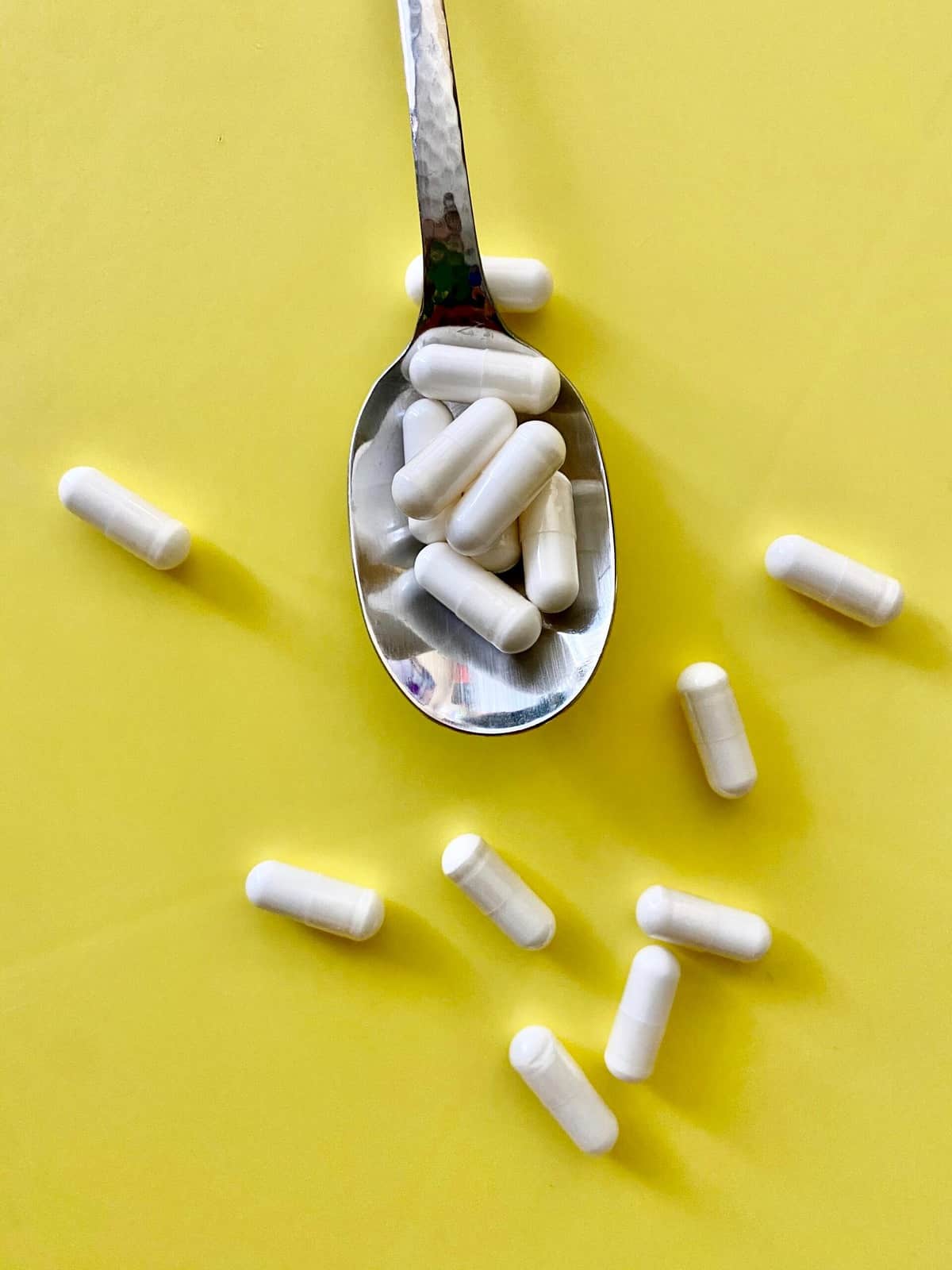We review the research to answer the question – can collagen supplements tighten skin? As well as explore other possible health benefits like joints, bones, and weight loss.

In recent years, nutrition supplements have been raging on the internet and sworn by beauty gurus and fitness junkies alike. One supplement caught up in the craze is collagen.
Collagen supplement fans claim it can reduce wrinkles, plump and tackle aging effects on skin. Alongside these claims, other proponents boast collagen as a tool to relieve joint pain, prevent bone loss and even promote weight loss. So we dive into the research to find out if collagen is all its cracked up to be and answer the question – can collagen supplements tighten skin?
What is Collagen?

Collagen is an abundant protein found in our bodies and vital for the structural integrity of our bones, skin, muscle, hair, and tendons. Collagen can be found in a variety of foods such as bone marrow and animal broths, but dietary collagen is not essential to our nutritional needs. This is because our bodies are naturally able to produce collagen by taking amino acids from protein rich foods and various other nutrients like vitamin C to make all the collagen we need, in house.
There are vegan “collagen boosting” supplements on the market, but these are made of vitamins (i.e. vitamin C) and minerals (i.e. zinc) that the body uses to make collagen. Researchers have also discovered a way to make vegan collagen using genetically modified yeast and bacteria, specifically P. pastoris. However, it is not yet widely available.
Types of Collagen
While nearly 28 types of collagen have been identified, there are four main types.
- Type I is made of densely packed fibres that provide structure to skin, bones, tendons, fibrous cartilage, connective tissue and teeth. Type I accounts for 90% of the body’s collagen.
- Type II is made of loosely packed fibres found in elastic cartilage to cushions joints.
- Type III supports the structure of organs, muscles and arteries.
- Type IV is found in the layers of the skin and aids in filtration.
Let’s dive into what the research says about collagen supplements and examine the four alleged benefits including skin health, joint pain, bone health, and weight loss.
Collagen and Skin Health

As we age, our production of collagen declines and impacts the structural integrity of our collagen network in our skin. This results in sagging of the skin, wrinkles and aesthetic effects of aging. However, the good news is that the research does seem to indicate that collagen supplements may tighten skin and help to delay skin aging.
For example, one 2015 study found that oral collagen supplementation increased skin hydration and density by improving both quantity and quality of the collagen network. Similarly, another 2015 randomized control trial looked closely at the effects of collagen on skin elasticity, hydration and wrinkles and found that participants experienced a significant reduction in the depth of wrinkles. Participants also experienced a 14% increase in water content in the skin, and improved skin elasticity.
In addition, a recent 2020 systematic review found that all studies reported beneficial effects of collagen supplementation on skin aging in both healthy and unhealthy subjects.
On the other hand, a recent 2019 review found that the few studies it evaluated found only modest benefits to using collagen supplement. The authors suggested that while preliminary findings are exciting, there are a lot of limitations to the research. For example, the studies used different collagen manufactures, varying doses, and confounding active ingredients such as vitamins and minerals, all of which may impact findings. Participant characteristics were also mixed in terms of geographical location, age, sex, and thus these variables impact our ability to generalize the results.
With that said, collagen supplementation may help to improve skin health however it also highly depends on the type of supplement used and how it is made.
Collagen for Joint Pain

Collagen is abundant in our tendons and ligaments. However, as we age and produce less collagen in the body, it increases the risk for joint disorders such as osteoarthritis (OA). Luckily, there is promising research indicating that collagen supplementation may help with OA by reducing pain and inflammation and increasing collagen synthesis.
An early 2006 review of the literature found that collagen supplements significantly increased collagen synthesis, resulting in improvements in OA pain and joint function. A more recent review from 2020 examining 41 also studies found significant benefits for OA symptoms and cartilage healing. Similarly, another 2019 meta-analysis of randomized placebo-controlled trials found that collagen is effective in improving OA symptoms.
While current preliminary research has been overall positive on the effects of collagen supplementation for joint relief, these studies are not without limitations. Namely, many clinical studies have been small scaled, short-term and in some cases, not even in humans.
Generally speaking, the body of research we do have suggests that collagen supplements may be an effective therapy for some people with joint disorders and joint pain, but we need more research to recommend it across the board.
Collagen for Bone Health

Osteoporosis (OP) is a disease of the skeletal system characterized by bone mass loss, reduced skeletal structure and increased risk of fractures. Aging is one contributing factor to OP that we can’t exactly prevent, but it’s been proposed that inadequate collagen earlier on in life may play a role.
Unfortunately, the current research on collagen and bone metabolism in humans is limited. However, there is a growing body of evidence that collagen may help support calcium absorption, bone density and bone formation.
For example, one 2018 randomized control study provided participants with 5 grams of collagen per day which resulted in a significant increase in bone density in the spine and neck. On the other hand, one 2000 study looked at populations throughout the USA, UK, and Germany found no significant differences in reported pain improvement from collagen, but some other symptom improvements in the German group and participants with severe OP.
So how much do you need to take to see a benefit? While various studies used different dosages, a 2016 review of the literature recommended a dosage of 12 g of collagen to encourage some of these bone building benefits.
Does Collagen Support Weight Loss?
Finally let’s talk about collagen’s alleged role in aiding in weight loss by “boosting” metabolism. One 2008 study tested oral consumption of gelatin (a source of collagen) during one meal on both “normal weight” and “obese” participants. The study concluded that gelatin may help maximize satiety, therefore potentially aiding in weight loss efforts in “obese” patients, but that would be true for any rich source of protein, including protein rich foods, not limited to collagen.
Should You Take a Collagen Supplement?

Most research we have on the benefits of collagen is relatively exploratory and preliminary, so we can’t say for certain that a very specific dosage or brand of collagen supplementation will result in the benefits discussed. I know it’s tempting to focus all our attention on one nutrient alone but we have to make sure we have an overall healthy diet.
Since our bodies are able to make collagen from breaking down protein, we don’t actually need to consume collagen specific supplements if you’re getting a wide range of collagen in the diet already. For example, you can derive collagen from bone broth, beef, chicken, fish, egg whites and dairy. In addition, as mentioned earlier, vitamin C plays an important role as a precursor to collagen. Therefore, consuming a variety of vitamin C containing fruits and vegetables (such as citrus fruit, bell peppers, cruciferous vegetables, and berries) are also important.
If you’re vegan and want to get your collagen fix from food you can consume foods that are high in the most abundant amino acids in collagen (glycine, lysine and proline). This includes foods such as soy products, black and kidney beans, pumpkin, squash, sunflower and chia seeds, pistachios, peanuts and cashews.
BOTTOM LINE
It’s important to keep in mind that supplements are not highly regulated. As mentioned, some collagen supplements add other ingredients to the product, such as vitamins, minerals and hyaluronic acid, and the combination of all these ingredients are not yet well understood. While the preliminary studies seem promising and safe, there is still a lack of large-scale randomized control trials and it is also still unclear what the optimal dose is.
Not to mention, some collagen supplements cost a pretty penny. So if you consume a well-balanced diet that includes foods naturally high in collagen ( such as meat, fish, eggs and dairy) and adequate amounts of protein in general, then you probably don’t need to spend extra cash on a collagen supplement! If you are curious about trying a collagen supplement, always speak to your doctor beforehand and make sure you choose a third party tested (e.g., ConsumerLab.com) product.
More Blog Posts You Might Like
- The Hormonal Acne Diet – The Best Foods for Healthy Clear Skin
- Foods that Cause and Treat Eczema
- Is Dairy Bad for Bones and Osteoporosis?
Contribution by Sydney Ma MHSc
Updated on July 20th, 2021

Abbey Sharp is a Registered Dietitian (RD), regulated by the Ontario College of Dietitians. She is a mom, YouTuber, Blogger, award winning cookbook author, media coach specializing in food and nutrition influencers, and a frequent contributor to national publications like Healthline and on national broadcast TV shows.





Leave a Comment